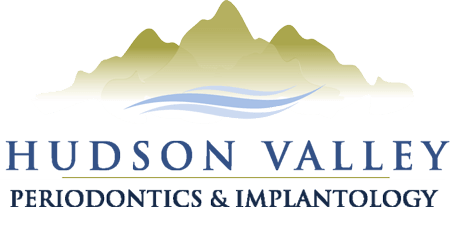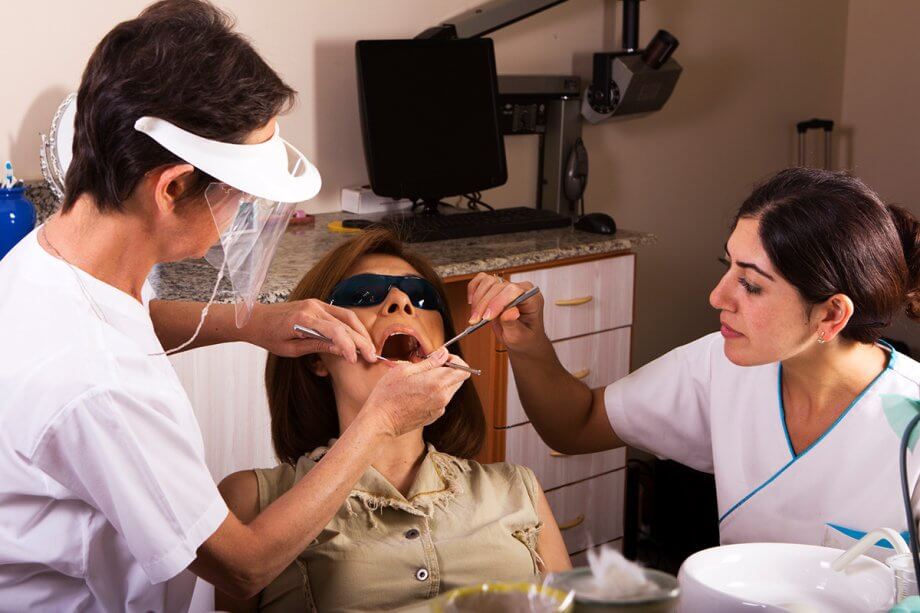Gum disease is arguably the most common oral health condition in America. It affects nearly half of all adults over the age of 30. Some are in the early stages of gingivitis, while others have fully progressed periodontitis.
The good news is that gum disease can be treated with the help of dental lasers. Laser dentistry provides revolutionary treatment options that can stop the progression of gum disease and reverse the resulting damage.
What is Gum Disease?
Gum disease, clinically called periodontitis, is a bacterial infection of the gum tissue. It occurs due to a buildup of plaque on the teeth, a sticky substance composed of food residue and bacteria. When plaque is not removed from the teeth it can harden into calculus, which is more difficult to remove and more likely to infect the gum tissue.
The earliest stage of gum disease is gingivitis, which is characterized by inflamed, swollen, and bleeding gums. Gingivitis is easily managed when detected early and professionally treated. Keeping it away requires diligent oral hygiene habits at home between dental cleanings.
When gingivitis progresses, it becomes gum disease. Gum disease results in more severe symptoms such as receding gums, loose teeth, and damage to the jaw bone.
Laser Treatments for Gum Disease
Laser dentistry has made major advancements in the treatment of gum disease and reversal of the associated damage. Treatments include:
- Elimination of diseased tissue. Dental lasers can automatically seek out diseased tissue and eliminate it, reducing the infection in the gums.
- Reduction of pockets in the jaw. Gum disease can cause pockets, or spaces to form between the teeth and the jaw bone. Dental lasers can reshape the bone to reduce these pockets in order to eliminate spaces for bacteria to gather.
- Crown lengthening. Removal of excess gum tissue can help to treat gum disease by reducing the spaces where plaque can gather. A dental laser can be used to remove the excess gum tissue and expose more of the tooth structure.
- Scaling and root planing. Dental lasers can be used for scaling and root planing, the process of removing plaque and calculus from the roots of the teeth under the gums and smoothing the root surface for improved gum tissue attachment.
Benefits of Laser Dentistry for the Treatment of Gum Disease
The use of dental lasers offers many benefits:
- Minimally invasive. Dental lasers are less invasive than traditional dental tools, making procedures more comfortable.
- Less anesthesia. Patients often require less anesthesia with the use of dental lasers since they are gentler.
- Reduced bleeding. Dental lasers naturally cauterize tissue to control bleeding during dental procedures.
- Faster recovery. The previously mentioned benefits result in faster recovery times after dental procedures.
Hudson Valley Periodontics & Implantology Uses Dental Lasers
If you would like to experience the benefits of laser dentistry in the treatment of gum disease, Hudson Valley Periodontics & Implantology provides a variety of procedures using dental lasers. We have seen the benefits firsthand, which is why we are proud to offer this service for the comfort and improved care of our patients.
To learn more, call 845-623-6666 or contact us today to schedule an appointment.
Frequently Asked Questions About Laser Dentistry
Are dental lasers safe?
The term laser may sound intimidating, but dental lasers are safer in many cases than traditional dental tools. A dental laser uses a concentrated beam of light energy to manipulate the tissues of the mouth in positive ways that improve oral health.
Why see a periodontist for gum disease treatment?
A periodontist is a dentist who specializes in the diagnosis and treatment of conditions affecting the support structures for the teeth, including the gums. Periodontists are more likely to have the advanced technology, such as dental lasers, and training necessary to effectively treat gum disease.

